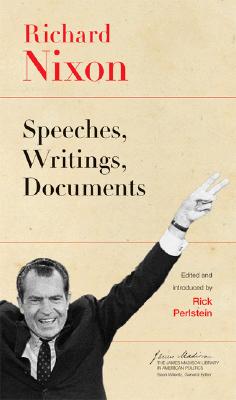

 Princeton University Press
Princeton University Press
Richard Nixon: Speeches, Writings, Documents


Key Metrics
- Sean Wilentz
- Princeton University Press
- Paperback
- 9780691136998
- 8 X 4.75 X 1.8 inches
- 0.74 pounds
- Biography & Autobiography > Presidents & Heads of State
- English
 Secure Transaction
Secure TransactionBook Description
The first book to present America's most controversial president in his own words across his entire career, this unique collection of Richard Nixon's most important writings dramatically demonstrates why he has had such a profound impact on American life. This volume gathers everything from schoolboy letters to geostrategic manifestos and Oval Office transcripts to create a fascinating portrait of Nixon, one that is enriched by an extensive introduction in which Rick Perlstein puts forward a major reinterpretation of the thirty-seventh president's rise and fall.
This anthology includes some of the most famous addresses in American history, from Nixon's Checkers speech (1952) and Last Press Conference (1962), to the Silent Majority speech (1969) and White House farewell. These texts are joined by campaign documents--including the infamous Pink Sheet from the 1950 Senate race--that give stark evidence of Nixon's slashing political style. Made easily available here for the first time, these writings give new depth to our understanding of Nixon.
Author Bio
Sean Wilentz studies U.S. political and social history. He received his Ph.D. in history from Yale University (1980) after earning bachelor’s degrees from Columbia University (1972) and Balliol College, Oxford University (1974).
Chants Democratic (1984), which won several national prizes, including the Albert J. Beveridge Award of the American Historical Association, shows how the working class emerged in New York City and examines the changes in politics and political thought that came with it.
In The Kingdom of Matthias (1994), Professor Wilentz and coauthor Paul E. Johnson tell the story of a bizarre religious cult that sprang up in New York City in the 1830s, exploring in the process the darker corners of the 19th-century religious revival known as the Second Great Awakening. Professor Wilentz is also the coauthor and coeditor of The Key of Liberty (1993) and the editor of several other books, including The Rose and the Briar (2004, Greil Marcus coeditor), a collection of historical essays and artistic creations inspired by American ballads.
His The Rise of American Democracy: Jefferson to Lincoln (2005), was awarded the Bancroft Prize and was a finalist for the Pulitzer Prize. Subsequent books include The Age of Reagan: A History, 1974-2008, a reconsideration of U.S. politics since the Watergate affair; Bob Dylan in America, a consideration of Dylan's place in American cultural history; and The Politicians & The Egalitarians: The Hidden History of American Politics, a thematic collection of essays covering American political history from the Revolution through the 1960s.
His most recent study, No Property in Man: Slavery and Antislavery at the Nation’s Founding, based on his Nathan I. Huggins Lectures at Harvard, appeared in 2018 and was the recipient of the annual Thomas A. Cooley Book Prize for the best book on the Constitution, awarded by the Georgetown University Law Center. In 2020, the Library of America published the first of three projected volumes of his authoritative edition of the writings of the historian Richard Hofstadter.
Professor Wilentz has received numerous fellowships from, among other institutions, the John Simon Guggenheim Foundation, the American Council of Learned Societies, and the American Academy in Berlin. Formerly a contributing editor to The New Republic, and currently a member of the editorial boards of Dissent and Democracy, he lectures frequently and has contributed some four hundred articles, reviews, and op-ed pieces to publications such as the New York Review of Books, the New York Times, the Washington Post, the Los Angeles Times, The Atlantic, the London Review of Books, The American Scholar, The Nation, Le Monde, and Der Spiegel.
He has also given congressional testimony, notably before the House Judiciary Committee in 1998. His writings on American music have earned him two Grammy nominations and two Deems Taylor-ASCAP awards.
Source: Princeton University
Videos






Community reviews
Write a ReviewNo Community reviews